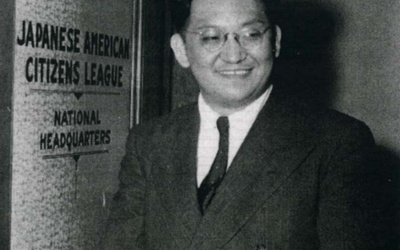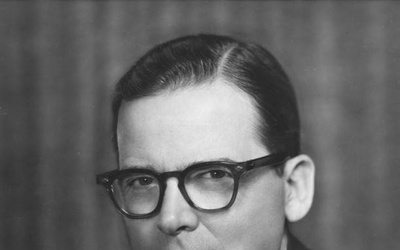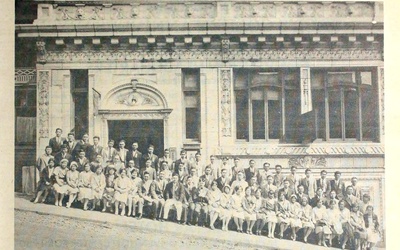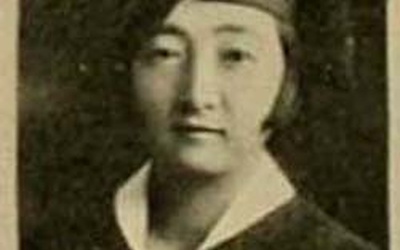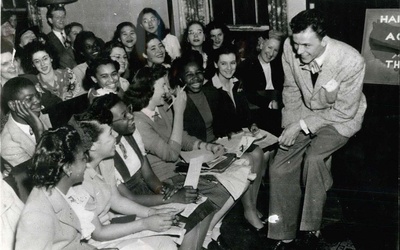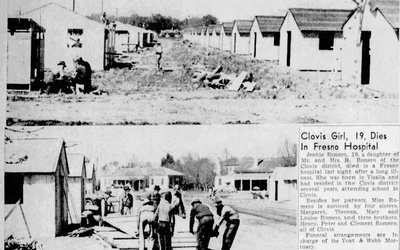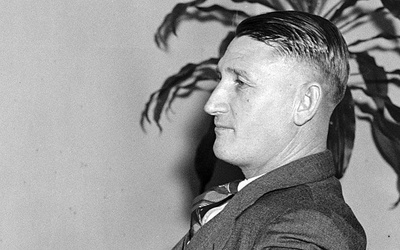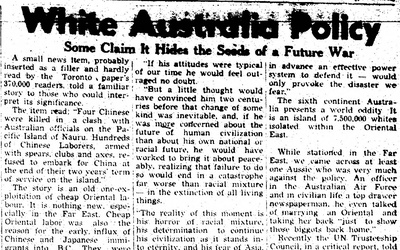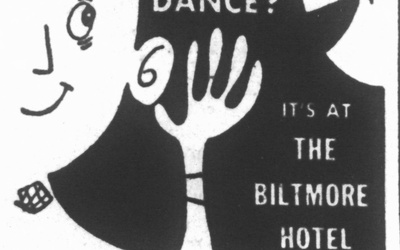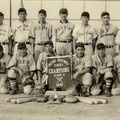
Jonathan van Harmelen
@jonathanJonathan van Harmelen is currently a Ph.D student in history at UC Santa Cruz specializing in the history of Japanese-American incarceration. He holds a BA in history and French from Pomona College and an MA from Georgetown University. He can be reached at jvanharm@ucsc.edu.
Updated February 2020
Stories from This Author
The 1944 Election: The Twilight of the Demagogues—Part 2
April 8, 2024 • Jonathan van Harmelen
Read Part 1 >> For Japanese Americans observing the election, the use of race-baiting elicited anger and, at times, a darkly comedic response. As Natasha Varner of Densho explains in her 2016 article about absentee voting in camp, Japanese American inmates still faced several bureaucratic hurdles from election boards two years after the 1942 election that made voting from camp difficult if not impossible. Larry Tajiri of the Pacific Citizen offered regular, insightful commentary to readers. Tajiri predicted that voters would still …
The 1944 Election: The Twilight of the Demagogues—Part 1
April 7, 2024 • Jonathan van Harmelen
Previously, I wrote an article for Discover Nikkei on how the incarceration of Japanese Americans affected the 1942 election and how Japanese Americans managed to participate in the election. Despite the traumatic events of being sent to camp and efforts by racist politicians to keep Japanese American from voting, many Japanese Americans still participated in the election through absentee ballot. For some Nisei, the election represented the last defense of their citizenship rights against government deprivation. For others, the site of …
Suma Sugi Yokotake – The Woman Who Became The First Japanese American Lobbyist - Part 2
March 8, 2024 • Jonathan van Harmelen
Read Part 1 >> Upon her return to Los Angeles, the Los Angeles JACL and the Rafu Shimpo feted Sugi’s successful lobbying efforts. The papers particularly noted the fact that Hiram Johnson, a noted anti-Japanese politician, voted in favor of the bill. Sugi’s lobbying served as a valuable test for future lobbying efforts. The Rafu Shimpo commissioned Sugi to write a column about her experiences in Washington. JACL leader Saburo Kido later stated that the Cable Act offered an important …
Suma Sugi Yokotake – The Woman Who Became The First Japanese American Lobbyist - Part 1
March 7, 2024 • Jonathan van Harmelen
One of the greatest accomplishments of the Japanese American Citizens League has been its success in lobbying Congress to enact legislation to support Japanese Americans and other Asian American groups. Long before the Redress movement of the 1980s, the JACL recognized the importance of Congressional action as a means of both raising awareness regarding issues affecting Japanese Americans and challenging unjust laws that discriminated against them and other Asian immigrant groups. Although the most famous of the JACL’s lobbyist was …
The House I Live In: Frank Sinatra and Japanese Americans
Jan. 31, 2024 • Jonathan van Harmelen
Archival research is often like gambling; either you get boxes of files that either contain golden information for your project, or a stack of dusty files that make you wonder if you wasted a day of work. And, sometimes, you come across a story you do not expect to find but makes the experience all the more rewarding. Such is the case with my research on the War Relocation Authority and celebrities. Occasionally, I find stories about famous individuals who, …
A Circus in Tulare: The Story of Congressman Alfred Elliott and the Incarceration of Japanese Americans — Part 2
Jan. 9, 2024 • Jonathan van Harmelen
Read Part 1 >> The next task on Elliott’s political agenda was to extend the border of the exclusion zone to all eastern portions of Tulare and Kern County. Initially, the Western Defense Command announced on March 2, 1942 that all Japanese Americans living west of Highway 99 in Exclusion Zone 1 were to report for incarceration. This, and the Army’s decision to allow for voluntary migration in March 1942, led to thousands of Japanese Americans to move to the eastern …
A Circus in Tulare: The Story of Congressman Alfred Elliott and the Incarceration of Japanese Americans — Part 1
Jan. 8, 2024 • Jonathan van Harmelen
As part of my ongoing dissertation research on Congress and the wartime incarceration of Japanese Americans, I have come across vignettes in several archives that illustrate the influential role played by members of Congress. While perhaps the most visible actions taken by Congress regarding Japanese Americans were holding public hearings (namely the Tolan, Dies, and Chandler Committees) and passing legislation (such as Public Law 503, the law that enforced Executive Order 9066), several individual members of Congress had a hand …
Continental Drift: How anti-Japanese sentiment in Australia affected Nikkei Communities in the US and Canada
Nov. 20, 2023 • Jonathan van Harmelen
During World War II, Japanese communities around the Pacific rim and elsewhere were subjected to displacement, internment, or incarceration. While the case of the West Coast of the United States is the most well-known, several nations hastily developed their own incarceration policies based on the assumption that Japanese communities, regardless of citizenship status or loyalty to the country, supported Japan. In most cases, the punitive treatment of Japanese immigrant communities followed in the trail of longstanding immigration policies to exclude …
A New Look at Nisei Veterans: Lawrence Matsuda and Matt Sasaki’s Fighting for America
Nov. 8, 2023 • Jonathan van Harmelen
In recent years, Chin Music Press has produced a great run of graphic novels on the wartime Japanese American experience. These include Frank Abe and Tamiko Nimura’s collaboration with illustrators Matt Sasaki and Ross Ishikawa on We Hereby Refuse, and the partnership of Kiku Hughes and Ken Mochizuki on Those Who Helped Us. Now Sasaki has “returned,” this time working with educator and activist Lawrence Matsuda on a revised version of their graphic book Fighting for America. As with We …
Keeping the Beat: The Story of Legendary Drummer Paul Togawa
Oct. 31, 2023 • Jonathan van Harmelen
As part of my ongoing series on Japanese American jazz musicians, I now turn to the fascinating story of Paul Togawa. Although most of the previous musicians I have showcased were all Nisei born in the 1920s, Togawa was a rare exception as a postwar Nisei who developed a successful career at a young age. As a jazz drummer who led his own orchestras and cut several records— one among few Japanese Americans, along with Tak Shindo, who did so …

